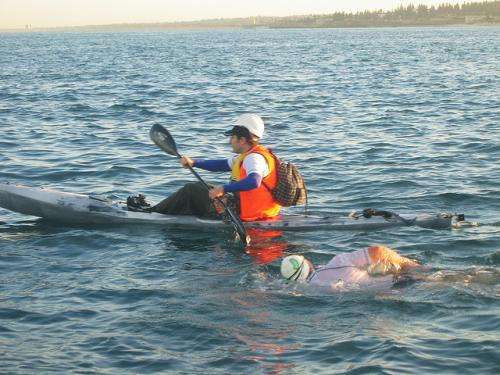Athletes urged to drink when thirsty after Rottnest swim incident

Long distance swimmers are being urged to drink when they are thirsty rather than to a set schedule after a woman was admitted to intensive care with critically low sodium levels following last year's Rottnest Channel Swim.
The 46-year-old woman suffered severe disorientation and a seizure on Rottnest Island after the 20km swim because of a condition known as exercise-associated hyponatraemic encephalopathy.
The life-threatening illness occurs when the amount of sodium in fluids outside cells drop and water moves into the cells to balance the levels.
This causes the cells to swell, which is particularly dangerous in the brain.
Exercise-associated hyponatraemic encephalopathy has been widely reported in marathon runners and ultra-endurance athletes but the woman's case is the first published instance of an athlete suffering the condition following an open water endurance swim.
St John of God Murdoch Hospital and University of Notre Dame Professor of emergency medicine Ian Rogers says the woman was lucky that experienced emergency doctors from Fremantle Hospital were at the Rottnest Island nursing post for the event, and they recognised what was happening.
The woman was airlifted from the island by the Royal Flying Doctors Service and admitted to the intensive care unit of Sir Charles Gairdner Hospital.
She ultimately recovered and was discharged from hospital.
Drinking when thirsty is preferred
Prof Rogers, who wrote a paper on the case, says endurance athletes should be encouraged to adopt a "drink to thirst" strategy, drinking when they feel thirsty rather than to set a rule.
The woman reportedly drank up to 1000ml of sports drink before the race and was on a regime of 200ml of fluid every 20 minutes during the event, alternating between sports drink and water.
It took her 8 hours and 17 minutes to complete the race and she reportedly drank another 2000ml of a combination of sports drink, tea and water after reaching the island.
"The human body evolved a long time ago to be able to maintain its fluid balance in settings where people didn't necessary have access to a lot of fluids on a regular basis," Prof Rogers says.
"If your body says you're thirsty, have a drink, and if you're body doesn't say you're thirsty, you don't need one.
"If you do that you'll sit somewhere in that comfortable middle ground where you won't run the risk of either becoming seriously overhydrated, which can lead to exercise-associated hyponatraemia and exercise-associated hyponatraemic encephalopathy, or seriously underhydrated."
















